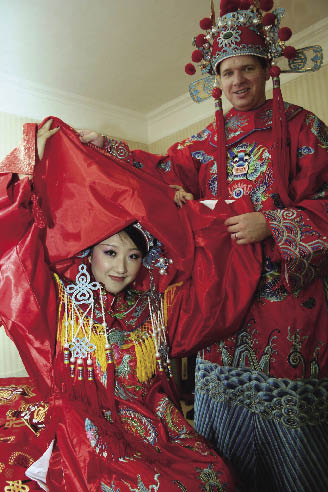|
New Millennium: Tolerance and Privacy
Sociologist Li Yinhe considers the period from the late 1990s to the early 21st century a watershed in love and marriage, a time when the Chinese experienced a social revolution that included attitudes toward sex. Courting and emotional attachment came out of the closet, and the Internet played a significant role in the process. An extensive marriage survey was conducted between 1996 and 2000 by the Shanghai Academy of Social Sciences involving 800 couples in Shanghai, Gansu, Guangzhou and Heilongjiang. Results told the tale that 3 out of 4 married couples tied the knot within half a year of dating. In 2007 students from the School of Psychology of Beijing Normal University conducted street intercept interviews in Beijing, Shanghai and Guangzhou, and found that 10 percent of the 1,204 married respondents got to know their spouse through Internet chatrooms.
In this period, dating on campus became common, and premarital sex was tolerated. In 2008, the Shanghai Andrology Research Institute questioned 5,234 students in 14 colleges and universities in the city. More than half of them had dated; 81.4 percent declared they were not against premarital sex; and 20.2 percent of men and 10 percent of women admitted they had engaged in sex.
Love and marriage became increasingly a private matter, reflected by changing marriage registration procedures. Before 2003, all marriages and divorces had to obtain a letter of certification from the applicants' workplace or neighborhood committee. Today, only a residence booklet and ID card are required for a marriage license, and an additional certificate gets you a divorce. The registration process in both cases takes no more than 20 minutes.
In the 1990s, keeping a mistress became vogue for "successful" men. The 2001 Marriage Law Amendment increased the amount of compensation that could be demanded by the wronged party in a divorce case. "Adulterers are penalized both financially and legally (cheating is grounds for divorce), but denial of a divorce suit is not an option regardless of who is wronged and how, as it inflicts pain on both sides," explained Professor Wu Changzhen. He concluded that the Marriage Law evolved to become more humane over the decades, "leaving legal matters to law, and ethical issues to ethics," as he put it.
The phenomenon of May-December unions with foreigners also changed in the late 1990s. In most cases, the age difference was within a normal range; both the spouses tended to be well educated; more Chinese men began to marry foreign women; and an increasing number of couples chose to reside in China after their nuptials. By 1994, annual international marriages hit a plateau at about 3,000 pairs. Meanwhile, divorce cases started to climb again. Still, the conventional Chinese mind places the family above romantic love. An exploration of changing values in Guangzhou, based on surveys from 1990 to 2008, showed the primacy of family harmony was upheld by a constant majority of more than 90 percent, while the rating of romantic love continued to decline, ranking 11th, a rank lower than "money" and "career development."
Professor Yue Guo'an of Nankai University holds that satisfaction with the quality of the Chinese marriage is at the upper end of the scale. The previously mentioned Shanghai Academy of Social Sciences study (1996-2000) backed that assessment: 22 percent of the respondents described their marriage quality as low; 75 percent, medium; and 3 percent claimed to have that elusive high-quality, perfect union.
|
 |
|
A Manchurian wedding ceremony was the choice for Shenyang's Liu Jia and her American husband Roy. Cnsphoto |
The same survey also showed that most marriages were stable however, even if, in most cases, not anchored in romantic love. More often than not, Chinese couples are more devoted to their children than their spouse, and take less time indulging themselves than they do their offspring. Nearly half of the respondents considered sex "of average importance" in their marriage, while 26.2 percent rated it as "relatively important," and 8 percent as "very important." Though 49.4 percent went on record as being satisfied with their intimacy in bed, more than one-third of the respondents confessed they did not exchange endearments or engage in erotic play with their spouse at other times.
The status of the Chinese wife in her family is steadily rising. Looking outward somewhat, the level of gender equality in a Chinese family is much higher than that of Japan, the ROK or other Asian countries, but lower than Sweden. A report issued in February 2009 by MasterCard International revealed that 79.9 percent of women on China's mainland claimed they controlled the family finances. This explains why advertisers in China usually target the gentler sex. |
